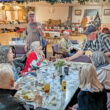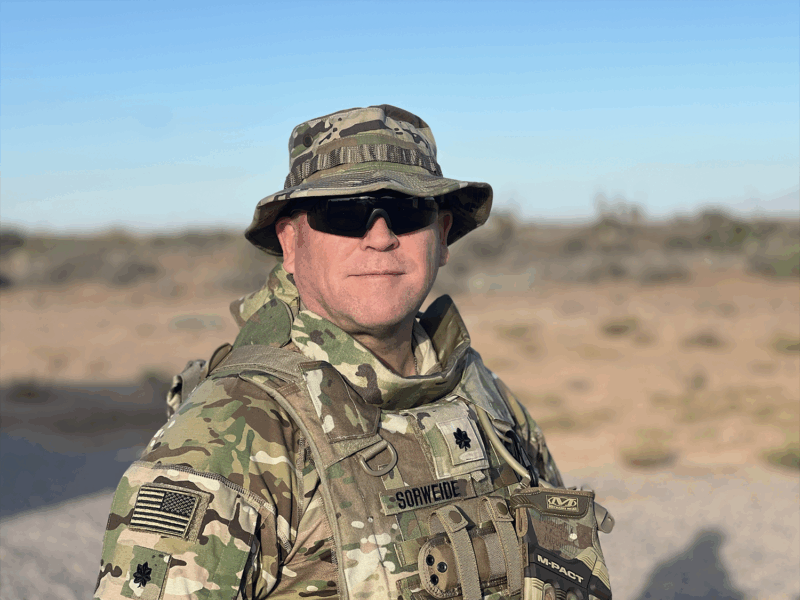If there’s such a thing as a typical, ordinary medical school professor, Dr. Derrick Sorweide is probably not it.
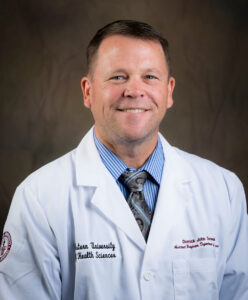 That becomes pretty clear pretty fast as Sorweide sits in his office at College of Osteopathic Medicine of the Pacific-Northwest in Lebanon, where he was one of the team who started the school in 2012.
That becomes pretty clear pretty fast as Sorweide sits in his office at College of Osteopathic Medicine of the Pacific-Northwest in Lebanon, where he was one of the team who started the school in 2012.
Oh, Sorweide is most assuredly a medical school professor. He teaches family medicine and cardiovascular curriculum, and is the school’s director of clinical education.
But he’s also an outdoors enthusiast and since 2016, he’s been a military man, serving three extended tours around the world. Now a lieutenant colonel in the U.S. Army Reserves, he serves as the medical readiness and training command surgeon for the reserve component.
In recognition of his service, Sorweide has been chosen to serve as grand marshal of this year’s Linn County Veterans Parade in Albany. He actually was chosen as the parade’s grand marshal last year, but was unable to attend because he was being deployed in the Middle East last fall.
Medicine Came First
Sorweide’s path to military service has been a series of steps, not all of them planned.
He spent his early years in Washington, but largely grew up in Las Vegas, Nev., after his father, an airline pilot who didn’t particularly like rain, decided to move there.
Sorweide initially worked in physical therapy, when “I decided to have a career change and applied to medical school.”
He originally planned to attend medical school on a military scholarship, “however, those plans kind of went sideways when both my parents were diagnosed with cancer.”
“My sister, who’s a nurse, and I ended up hospiceing them and that was not a good time for me to leave the country.”
He received his doctorate of osteopathic medicine from Kirksville College of Osteopathic Medicine in Missouri before completing his residency in family medicine at the University of North Texas Health Sciences Center and Dallas Southwest Medical Center.
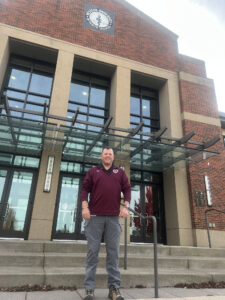
Sorweide said he’d always loved the Northwest, so “as soon as I got done with (the residency), I knew I was going to come out to Oregon. So I came out and established Sorweide Family Medicine in Grants Pass. He continued there for 16 years before joining the team at COMP-Northwest.
“I’m actually one of the founders,” Sorweide said.
He had gotten involved in the Osteopathic Physicians and Surgeons, an organization that provides continuing education and representation for osteopaths in the state, and got acquainted with Larry Mullins, CEO of Samaritan Lebanon Community Hospital at the time, and Paula Crone, who later became dean of COMP-Northwest.
“That just blossomed, the relationships with a lot of people,” he said. “I saw such a good group of folks, some of the best friends I’d ever made in my life, and it was a project that I knew I could put myself behind and that I wasn’t, you know, I wasn’t going to end up regretting it.”
He sold his practice and moved north to help start the school.
He also met Dr. Leslie Stevens, a graduate of Western University School of Health Sciences in Pomona, Calif., which is now the sister school for COMP-Northwest. They’re now married.
Late Arrival to Army
Through it all, Sorweide had never lost interest in military service.
“I always wanted to serve in the military,” he said. “I thought those days were over with, because I started having kids and started a practice and did all my things, and then I came up here to start working for the school, and suddenly I had a very supportive environment.
“The school has always supported my efforts to go into the military. My wife grew up in an Army family. Actually, her brother was my first commander, and her dad commissioned me.
“So she said, ‘Hey, you’ve always wanted to do this. Why don’t you? You’re not too old. Go do it.’”
So he did, joining the Army Reserves in 2016.
“I was a late bloomer in the Army,” Sorweide said. “I commissioned at 49.”
He started working in a combat support hospital (CSH) as a primary care doctor.
“My job was pretty much to make sure, early on, that all the other soldiers around me were fit to go and do these deployments and assignments that they received. And so we did all the primary care part of that.”
In 2018 he got tagged to deploy to the Middle East.
“I got a call and they said, ‘Hey, you’ve done hospitalist work. You’ve also done some ER work. Would you mind being an ER doctor for this deployment?’
“And I was like, ‘I can do that.’”
He said that deployment, in Kuwait and then in Iraq, established his reputation as an ER doctor.
“That kind of let the military know that I can function in that manner,” Sorweide said. “And most of my other deployments have been in that regard.”
During COVID, he was deployed as an ER doctor to South and Central America, where the Army was carrying out anti-drug and anti-human trafficking efforts.
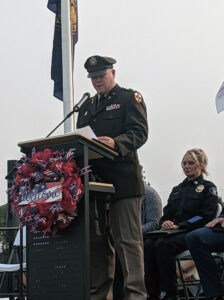
File Photo
Thanks to COVID travel restraints, he was deployed for nine months that time – in what was supposed to be a 90-day stint that was prolonged due to the pandemic.
Plus, he was forced to stay in the Texas desert “in the middle of nowhere” for three weeks before and after the Central America deployment at an “old World War II tank gunnery range with a Quonset hut – that’s where they put us up.”
“By the time we left, three weeks later, there were, like, 80,000 people living out there because the entire military couldn’t leave the country. There was a travel ban, so they were just sticking us all out there to quarantine us.
“They had taped-off sections, like 100 yards by 100 yards and that was your thing. You couldn’t cross over because they didn’t want to contaminate groups, right? So, yeah, it was interesting.”
Most recently, he worked in eight different countries in the Middle East as part of a command team that focused on humanitarian work. Currently, he holds the position of command surgeon for the 2nd Medical Brigade of the U.S. Army Reserve, overseeing all medical military personnel in six western states.
“So actually, I saw a few patients, but that wasn’t my role. My role was to make sure everybody else was doing their job. So we oversaw eight countries and what the medical teams in those eight countries had to deal with.”
Then, last spring, he got diagnosed with cancer, from which, Sorweide said, he’s recovered.
Outdoors Orientation
Meanwhile, not only does he run academic programs at the university when he’s not deployed, but Sorweide also advises COMP-Northwest’s Military Medicine Club and its Wilderness Medicine Club.
Over his years at COMP-Northwest, he also founded Joint Military Medicine Trauma Training events in Lebanon, a bicycle interest group for students and Crash Cart Talks – informal educational sessions designed to teach medical students and staff how to respond to emergency situations and the use of a medical crash cart, which carries medication and equipment used to save lives in hospital emergencies.
“I love austere medicine,” said Sorweide, who also said he enjoys fly fishing, hunting and general outdoors recreation. “I love, you know, going out in the middle of nowhere to do what I do. So I’m having a lot of fun.
“When I lived in Grants Pass I was a huge fly fisherman,” noting that he lived near the junction of the Rogue and Applegate rivers. “I fished all the time, pretty much for my sanity.”
He said he and students will be putting on a winter medicine conference at Mount Hood this year.
“All my students are actually participating in that with me.”
COMP-Northwest club members compete against teams from half a dozen other medical schools, nursing programs and military groups in “Med Wars.”
“They get together in the Northwest and they compete, and you have to build a fire from scratch. You have to build a shelter from scratch. You have to do these medical scenarios. You have to rescue people out of a ravine, out of the water.”
Sorweide said he is waiting to find out how long his military career will continue.
“I turned 60 this year,” he said. “So I’ll find out this year, if I’m still in the Army or not, whether they can extend me past 60. There’s got to be a need for it.”
His four children are all out of the house – none pursuing medical careers – and his wife is nearing retirement from Kaiser Permanente in Keizer.
“She’s done it all correctly,” Sorweide said wryly, adding “Where I did all the stuff that we were told not to do in the ‘90s but I did it anyway.”
The Sorweides have three grandchildren.
He and Leslie enjoy camping, he said, noting that they’d just returned from a long-postponed outing, delayed by his cancer treatments.
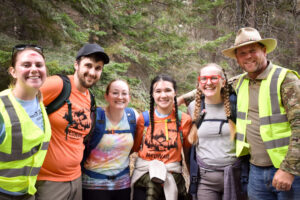
Photo courtesy of COMP-Northwest
“We’d been putting it off and I wasn’t going to put that off any longer,” he said. “We went out in the middle of the East Oregon desert and found some hot springs and went up in the Steens Mountains.
“I love Oregon. There’s no other state where I can have ocean, mountains, desert – whatever I want, all within an hour. Oregon’s got everything I’d ever want.”
He said he also likes fishing with one of his sons, who’s a firefighter for Oregon Department of Forestry.
“The little bugger has become a much better fly fisherman than me,” Sorweide observed, adding that being in the woods frequently puts his son at an advantage over his dad.
“He finds streams that we don’t know about. So every year we try to do what we call our “trout bomb” trip, where we just go out and we dirt bag it and go fishing. I’m loving getting back to that, especially as I think my Army career is about to come to an end. I’ll have more weekends available to me.”
One gets the strong sense that Sorweide’s found ways to do things he’s enjoyed, including teaching, without a lot of regrets.
“I have always felt very fortunate,” he said. “I was born with a good mom and dad, and a good family with a decently strong body and a decently strong brain.
“I felt like I owed the world that. My way of giving back has been to go and do things.”
– Emily Campbell of COMP-Northwest contributed information for this story.



